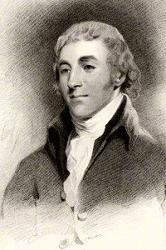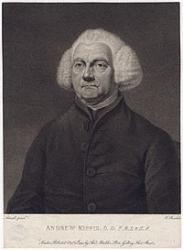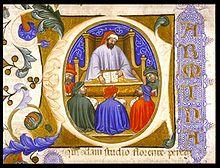Planning worship?
Check out our sister site, ZeteoSearch.org,
for 20+ additional resources related to your search.
- |
User Links
Person Results
‹ Return to hymnal



Export as CSV
Thomas Gisborne

1758 - 1846 Hymnal Number: 270 Author of "A soldier's course, from battles won" in A Collection of Psalms and Hymns for Christian Worship. (45th ed.) Thomas Gisborne was born at Derby, in 1758. He became perpetual Curate of Barton-under-Needwood, Staffordshire, in 1783, and Prebendary of Durham in 1826. He died in 1846.
--Annotations of the Hymnal, Charles Hutchins, M.A. 1872.
==================
Osborne, Thomas, M.A., son of Mr. John Gisborne, of Yoxall, was b. circa 1760, and educated at St. John's College, Cambridge, where he was 5th Wrangler of his year, and Chancellor's Medalist, graduating B.A. in 1780, and M.A. in 1783. Subsequently he became a Prebendary of Durham. He was the author of Sermons; the Duties of Men; the Duties of Women; Poems Sacred and Moral, 1799 (to the later editions of which his hymns were added), 3rd ed. 1803; and of another volume of poetry entitled, Walks in a Forest, 1795. The following hymns by him are found in the Uttoxeter Selection:—
1. A soldier's course from battles won. Soldiers of Christ. No. 72, in 6 stanzas of 4 lines, and in several hymn-books.
2. Hark! 'tis the bell with solemn toll. Death. No. 74, in 6 stanzas of 4 lines.
3. O Father, glorify Thy name. In Sickness. No. 92, in 5 stanzas of 4 lines.
4. Saviour! when night involves the skies. Christ All and in All. No. 80, in 4 stanzas of 4 lines.
5. Thy humblest works with full accord. Teachings of Nature. No. 118, in 4 stanzas of 4 lines.
6. When groves by moonlight silence keep. The hour of Peace. No. 116, in 4 stanzas of 4 lines.
All the above hymns, except No. 2, are in Gisborne's Poems, 3rd ed., 1803.
-- Julian, John, Dictionary of Hymnology (1907)
Thomas Gisborne
Baptist Wriothesley Noel
1799 - 1873 Person Name: Baptist W. Noel Hymnal Number: 587 Author of "When restless on my bed I lie" in A Collection of Psalms and Hymns for Christian Worship. (45th ed.) Noel, Hon. Baptist Wriothesley, M.A., younger son of Sir Gerard Noel Noel, Bart., and brother of the Earl of Gainsborough, was born at Leithmont, near Leith, July 10, 1799, and educated at Trinity College, Cambridge. Taking Holy Orders he was for some time Incumbent of St. John's Episcopal Chapel, Bedford Row, London, and Chaplain to the Queen; but in 1848 he seceded from the Church of England, and subsequently became a Baptist Minister. He was pastor of St. John's Street Chapel, Bedford Row, until 1868. He died Jan. 19, 1873. His prose works, about twelve in all, were published between 1847 and 1863. His association with hymnology is through:—
(1) A Selection of Psalms and Hymns adapted chiefly for Congregational and Social Worship by Baptist Wriothesley Noel, M.A. (2) Hymns about Jesus, by Baptist Wriothesley Noel, N.D. A collection of 159 hymns, the greater part of which are his own or recasts by him of older hymns.
The Selection appeared in 1832. It passed through several editions (2nd ed., 1838; 3rd, 1848, &c), that for 1853 being enlarged, and having also an Appendix of 39 original "Hymns to be Used at the Baptism of Believers." From this Selection the following hymns are still in common use:—
1. Devoted unto Thee. Holy Baptism. From "0 God, Who art our Friend."
2. Glory to God, Whose Spirit draws. Holy Baptism.
3. Jesus, the Lord of glory died. Jesus the Guide.
4. Lord, Thou hast promised to baptize. Holy Baptism.
5. We gave [give] ourselves to Thee. Holy Baptism.
--John Julian, Dictionary of Hymnology (1907)
Baptist Wriothesley Noel
R. C. Waterston
1812 - 1893 Person Name: Robert C. Waterston Hymnal Number: 704 Author of "Great Source of good, our God and Friend" in A Collection of Psalms and Hymns for Christian Worship. (45th ed.) Waterston, Robert Cassie, M.A., son of Robert Waterston, was born at Kennebunk, in 1812, but has resided from his infancy at Boston, Massachusetts. He studied Theology at Cambridge; had for five years the charge of a Sunday school for the children of seamen; was associated for several years with the Pitts Street Unitarian Chapel, Boston; and then pastor for seven years of the Unitarian Church of the Saviour in the same city. Much of his time has been given to literature, and a long list of his papers of various kinds is given in Putnam's Singers and Songs of the Liberal Faith, 1874. He also interested himself largely in educational matters. He contributed one hymn to the American Unitarian Cheshire Pastoral Association Christian Hymns, 1844; to his own popular Supplement to Greenwood's Psalms and Hymns, 1845, and others to various works. Putnam gives 20 poetical pieces in his Singers and Songs, &c, 1874, amongst which are the following, which are in common use at the present time:—
1. In darkest hours I hear a voice. Looking unto Jesus. Contributed to Putnam's Singers and Songs, &c, 1874, and found in a few collections.
2. In each breeze that wanders free. Nature and the Soul. Published before 1853, and again in Putnam, 1874. The hymn "Nature, with eternal youth," in Hedge and Huntington's Hymns for the Church of Christ, 1853, No. 185, is composed of stanza iv-vii. of this piece.
3. One sweet [bright] flower has drooped and faded. Death of a Child. Appeared in the American Unitarian Cheshire Pastoral Association Christian Hymns, 1844, No. 668, and again in Putnam, 1874, as “One bright flower, &c." It is in several collections. In the Christian Hymns the heading is "Death of a Pupil;" and Putnam, "On the Death of a Child. Sung by her classmates."
In Putnam there are other pieces by him which are worthy of attention. [Rev. F. M. Bird, M.A.]
-- John Julian, Dictionary of Hymnology (1907)
R. C. Waterston
Jane Cotterill
1790 - 1825 Hymnal Number: 415 Author of "O thou who hast at thy command" in A Collection of Psalms and Hymns for Christian Worship. (45th ed.) Cotterill, Jane, née Boak, daughter of Rev. John Boak, and mother of the Right Rev. Henry Cotterill, Bishop of Edinburgh; born in 1790, married 1811 to the Rev. Joseph Cotterill; died 1825. Mrs. Cotterill contributed to the Appendix to the 6th ed. of Cotterill’s Selection, 1815, the following hymns:—
1. "O! from the world's vile slavery," (For Holiness). 2. "O Thou! Who hast at Thy command," (For Resignation). These hymns were repeated in Montgomery's Christian Psalmist, 1825, and Mrs. Cotterill's name was appended thereto for the first time. Their use is not extensive. The first, "O! from the world's," &c, is found in Kennedy, 1863, No. 521, as, "From this enslaving world's control," the alterations being by Dr. Kennedy.
--John Julian, Dictionary of Hymnology (1907)
Jane Cotterill
Henry Moore
1732 - 1802 Hymnal Number: 287 Author of "All earthly charms, however dear" in A Collection of Psalms and Hymns for Christian Worship. (45th ed.) Moore, Henry, 1732-1802. Son of a Presbyterian minister of the same name at Plymouth. Educated at Doddridge's Academy at Northampton, from 1757 to 1788 minister at Modbury, and then at Liskeard. Author of Lyrical and Miscellaneous Poems, published posthumously with a memoir by Dr. Aikin. Of his hymns, which are frequent in the books later than Kippis, the Dukinfield Collection, 1822, gives 5.
1. All earthly charms, however dear. The unfading beauty of holiness.
2. Amidst a world of hopes and fears. A prayer for guidance.
3. Assist us, Lord, to act, to be. Divine Help Solicited.
4. My God, thy boundless love I praise. The divine Love.
5. Soft are the fruitful showers that bring. A song of spring and New Life.
6. Supreme and universal light. Prayer for spiritual excellence.
--John Julian, Dictionary of Hymnology (1907)
Henry Moore
Alice Flowerdew
1759 - 1830 Hymnal Number: 549 Author of "Fountain of mercy, God of love" in A Collection of Psalms and Hymns for Christian Worship. (45th ed.) Flowerdew, Alice, was born in 1759, and married to Mr. Daniel Flowerdew, who for a few years held a Government appointment in Jamaica, and died in 1801. After his decease Mrs. Flowerdew kept a Ladies' Boarding-school at Islington. During her residence at Islington she was a member of the General Baptist congregation, in Worship Street (now at Bethnal Green Road). Subsequently she removed to Bury St. Edmunds, and some years later to Ipswich, where she died Sept. 23, 1830.
In 1803 she published a small volume of Poems on Moral and Religious Subjects. This work reached a 3rd edition in 1811, and in that edition appeared her well-known harvest hymn, "Fountain of mercy, God of love," q.v. Mrs. Flowerdew's maiden name has not been ascertained. [Rev. W. R. Stevenson, M.A.]
--John Julian, Dictionary of Hymnology (1907)
Alice Flowerdew
Andrew Kippis

1725 - 1795 Hymnal Number: 89 Author of "Great God in vain man's narrow view" in A Collection of Psalms and Hymns for Christian Worship. (45th ed.) Kippis, Andrew, D.D., was born at Nottingham, March 28,1725, and educated for the ministry under Dr. Doddridge at Northampton, 1741-46. After a short residence with congregations at Boston and Dorking, he settled in London in 1753, as minister of the Princes Street Chapel, Westminster. There lie remained till his death in 1795, holding rank as the leading Presbyterian minister in the metropolis. For many years he was classical tutor at the Hoxton Academy, and afterwards at the Hackney College. He contributed largely to the Gentleman's Magazine and the Monthly Review, and edited five volumes of a new edition of the Biographia Britannica, a work commenced in 1778, and interrupted by his death on Oct. 8, 1795. His Life of Captain Cook was also published separately, and to his edition of Lardner's Works (1788) a Memoir was prefixed. His degree of D.D. was con¬ferred by the University of Edinburgh in 1767.
He was joint editor of A Collection of Hymns and Psalms for Public and Private Worship, selected and prepared by Andrew Kippis, D.D., &c. ; Abraham Rees, D.D., &c.; Rev. Thomas Jervis, and Rev. Thomas Mor¬gan, LL.D., London, 1795. This collection, commonly known as Kippis's, but sometimes as Kees's, passed through many editions, a Supplement being added in 1807, and was very generally used during the early decades of this century by congregations of Presbyterians and others, then become Unitarian in London and throughout the country [Unitarian Hymnody, § 9]. It contained 690 hymns.
The aim of the editors in their selection was to avoid “everything of a doubtful or disputable kind," and they adopt the language of Dr. Watts in the preface to his Hymns, "The contentious and distinguishing word of sects and parties are excluded." The alterations and omissions to adapt various hymns to the standard of the editors are considerable, though very little compared to what was done by others before and after them. The tone of the collection is somewhat colourless, and it gradually gave place among Unitarians to others which contained fuller and more varied expression of distinctively Christian feeling.
Two hymns by Kippis appear in this Collection.
1. Great God, in vain man's narrow view, The Incomprehensibility of God, which was generally adopted in later Unitarian books, and appears in Martineau's Hymns, 1840 and 1873.
2. How rich thy gifts, Almighty King, National Thanksgiving, which is four stanzas of the hymn, "Say, should we search the globe around," written for the thanksgiving appointed Nov. 29,1759, and appended to his Sermon on that occasion. It was given in full in Pope's Collection, 1760; and the Liverpool Octagon Collection, 1763. In Lindsey's Collection, 1774, five stanzas are given; in other early books only four, as in Kippis. The last two stanzas, somewhat altered, appear anonymously as: "With grateful hearts, with joyful tongues," in the Congregational Hymn Book, 1836, and the New Congregational Hymn Book, 1859.
[Rev. Valentine. D. David, M.A.]
--John Julian, Dictionary of Hymnology (1907)
Andrew Kippis
Edmund Butcher
1757 - 1822 Hymnal Number: 269 Author of "From north and [to] south, from east and [to] west" in A Collection of Psalms and Hymns for Christian Worship. (45th ed.) Butcher, Edmund, born at Colchester, Essex, in 1757, and brought up as a linen-draper. After undergoing a preliminary training for the Unitarian Ministry, he was appointed to the charge of Leather Lane Chapel, Holborn, in 1789. From thence he removed to Sidbury Vale, Sidmouth, in 1798. Died April 14, 1822. Memoir in the Christian Moderator, 1827. His works include Picture of Sidmouth; Tour through various parts of England; Sermons, to which are added suitable Hymns, 1798; and the Substance of the Holy Scriptures Methodized, 1801. His hymns were given in the two latter works, in the Protestant Dissenters’ Magazine (of which he was some time editor); in Kippis's Collection, 1795; the Christian Guardian, 1802-1808; Aspland's Selection, 1810; and from his manuscript in Howse's Selection of Hymns and Psalms, 1837. They number 116 in all; but few, however, have attained to any position in modern hymnals. These include the following:
1. Blest is the man that [who] fears the Lord. Ps. cxii. Published in the Exeter Unitarian Collection, 1812, in 5 stanzas of 4 lines. It is in common use in Great Britain and America.
2. Father of all, where shall we find? Divine Worship. In Dr. Martineau's Hymns, 1840, &c.
3. Great God, as seasons disappear. Harvest. This is the most popular of his hymns. It is annotated under its first line.
4. Hosanna! let us join to sing. Resurrection. Contributed to Aspland's Selection, 1810, No. 290; and repeated in Dr. Martineau's Hymns, 1840, &c.
5. With deepest reverence at Thy throne. God's Unsearchableness. This is in American common use as in Laudes Domini, 1884, No. 248. It was contributed to Aspland's Selection, 1810, No. 146.
-- John Julian, Dictionary of Hymnology (1907)
Edmund Butcher
A. M. S. Boethius

480 - 524 Hymnal Number: 384 Author of "O thou whose power o'er moving worlds presides" in A Collection of Psalms and Hymns for Christian Worship. (45th ed.) Anicius Manlius Severinus Boëthius, commonly called Boethius(English: /boʊˈiːθiəs/; also Boetius /boʊˈiːʃəs/; c. 480–524 AD), was a Roman senator, consul, magister officiorum, and philosopher of the early 6th century.
See more in:
Wikipedia
A. M. S. Boethius
George Dyer
1755 - 1841 Hymnal Number: 556 Author of "Great Framer of unnumbered worlds" in A Collection of Psalms and Hymns for Christian Worship. (45th ed.) Dyer, George, B.A., 1755-1841. Educated at Christ's Hospital and Emmanuel College, Cambridge. The friend of Charles Lamb, of Priestley and Wakefield, and biographer of Robert Robinson of Cambridge. In 1792 he moved to London, to chambers in Clifford's Inn, Fleet Street, supporting himself by private tuition and literary work. He was a contributor to the Gentleman's and the Monthly Magazine, for which he wrote the introductory Ode in 1796. From 1809 to 1830 engaged upon Valpy's edition of the Classics, in 141 vols. Author of a History of the University and Colleges of Cambridge, 1814, and of several volumes of verse. Three of his hymns are in Kippis, and frequently in other books.
1. Greatest of beings, source of life. Hymn to the Deity.
2. Greatest of beings, source of life. The same continued.
3. Great Framer of unnumbered worlds. Hymn for a Fast
--John Julian, Dictionary of Hymnology (1907)
George Dyer


 My Starred Hymns
My Starred Hymns


